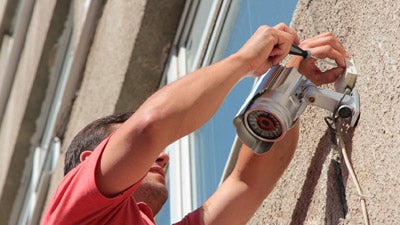
As a company grows and expands, there is more opportunity for strangers to enter the premises, with possible access to all that’s there. In this digital age, it’s important to remember that data is just as sensitive as anything physical a company owns – maybe even more so.
Security breaches are inevitable in any business. The trick is to do everything we can to reduce the risk of one happening in the first place and then react quickly if it does happen. There are always new threats coming our way, but that doesn’t mean we have to live in fear or be paralyzed by them. Security breaches are not an “if” but a “when” proposition for every company with employees who need access to confidential information.
So what can you do today so you’re prepared for tomorrow?
Use Employee ID Cards
Every employee who has access to the company network or computers should have an ID card with their photograph and name printed on it. This is a simple but effective way to identify employees. It is also helpful if the business later needs to investigate a cyber security breach. The ID card should be linked to an internal database that records when and where an employee was last seen or whether they used a specific computer to log in to the network. There are many other ways to effectively use ID cards and this post can answer your ID badge questions.
Restrict Access
These days, companies can use identity and access management software to help control who has access to what and when. Any employee with access to the network from their desk or a computer on their desk should monitor their computer for unusual activity. If an employee logs in from an unknown location or uses a public computer, the company should change their password as soon as possible and revoke their network access. It’s also a good idea to change the passwords regularly. Many offices have card readers that control access to certain rooms or computer systems. This can be a very effective way to restrict access to sensitive computer systems or information.
Install Security Cameras
If you have sensitive areas in the office – a server room or a break room where confidential discussions occur – install security cameras. Ensure employees know where those cameras are located, so they don’t appear to be trying to circumvent the system. This is an excellent way to monitor access to sensitive areas. You can review the footage to identify the culprit if you see suspicious activity.
Depending on where the cameras are installed, they can also be used to monitor employees’ activities. If you choose to use cameras for this purpose, make sure you follow any state or federal laws. The best practice is to have a clear policy that specifies what the cameras are being used for, who has access to the footage, and how long it’s kept.
Hire Security Guards
Additionally, it is advisable to consider hiring a security guard, as their presence is essential for actively monitoring surveillance cameras and responding to emergencies immediately. A well-equipped security guard should have the necessary tools, ranging from a professional uniform to self-defense equipment and communication devices. Effective communication is important, particularly when multiple security guards are involved. You can either provide phone-based communication systems or two-way radio electronic accessories.
Two-way radios for security guards are preferable, as unlike phone-based communication systems, they provide customized coverage and capacity that caters specifically to precise locations within the site. As a result, security guards can work seamlessly without concerns regarding external networks like cellular networks.
Encrypt Sensitive Data
If your company stores data remotely, it may be possible to encrypt it. This can help to reduce the risk of sensitive information being stolen by hackers, identity thieves, and other malicious parties. If your company doesn’t store data remotely, you may want to encrypt any sensitive data stored on company computers.
If your company uses email to send confidential information, you should encrypt emails using an end-to-end encryption program such as PGP. Your employees should also use a different password for every account they use. This is good security practice. It can also be helpful if additional employees use other email providers and have separate email addresses. You should also consider the use of VPNs (virtual private networks) that protects your privacy. There are many to choose from, like in this review of Surfshark vs. NordVPN, so do your homework.
Install Environmental Controls
As with any physical protection system, environmental controls can protect your data. This means insulating sensitive computer components from temperature extremes and humidity, keeping electrical systems from dust and dirt, and implementing clean-air policies to reduce the risk of airborne contaminants.
These controls can be as simple as installing an air filter to remove dust and running temperature and humidity sensors to alert when settings are out of range. There are also sophisticated systems for controlling clean air flow, locking down or shutting off access to sensitive equipment, and even remotely monitoring systems for performance and functionality.
Ensure Employees Know Their Role In Staying Safe
As with any safety training program, ensure employees know the risks and how they can stay safe. For example, be sure everyone understands the importance of keeping passwords strong and unique, not clicking on links they don’t know or trust, and reporting unusual or suspicious activities to security. Make this information available in an easily accessible location.
Be sure to include information about what to do during a security breach. For example, what information employees should report (date, time, location, etc.) and how they should report it (by phone, email, etc.). Your security team should also be available to answer questions from employees about their role in preventing breaches. This reinforces the message and shows that management is taking the issue seriously.
Outsource Cyber Security and Software Maintenance
Keep up with the latest threats by partnering with a reputable third party for cyber security services. You don’t have to be an expert in every new type of malware or software exploit that comes along. These third-party providers will have IT specialists who keep current on the latest threats and how to best protect against them. While it might cost more upfront, the protection offered by a third-party provider is likely more robust than what you could buy in a retail package. It’s also more likely to get regular updates as new threats emerge and are compatible with your company’s technology.
In addition, many providers offer warranties and service-level agreements that will cover you if they miss a threat. This is critical since, according to Verizon, businesses spend an average of $1.5 million to $3 million on each data breach. For software maintenance, you must ensure you’re keeping up with patches and updates as they become available. While doing this internally is a great idea, it’s time-consuming and requires additional staff. Consider outsourcing this responsibility to a third-party provider that can proactively monitor your systems for vulnerabilities and ensure patches are applied when necessary.
Conclusion
The good news is that most security breaches can be prevented with the proper procedures. The key is knowing where the dangers lie and minimizing risk before it becomes a full-blown breach. Whether it’s a computer hack, theft of confidential information, or a simple password breach, these problems can be avoided or minimized with the proper precautions.
2295 Views













